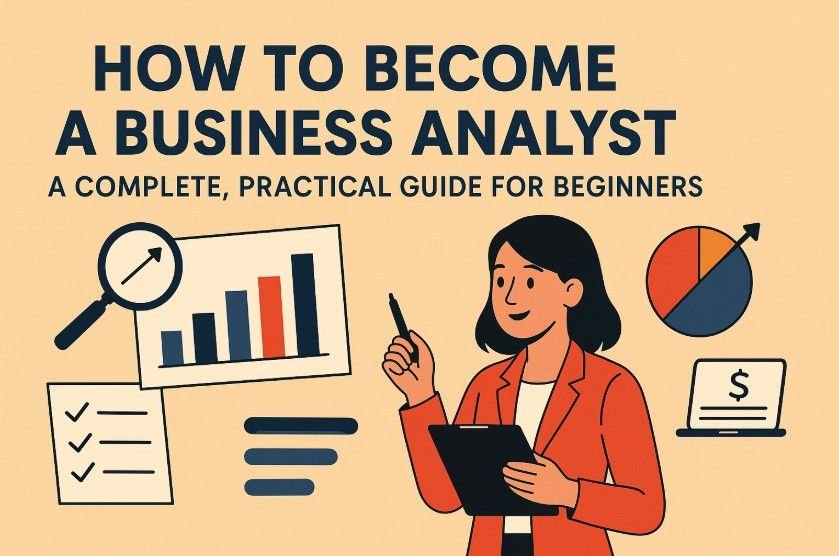
Before you decide how to become a business analyst, you need to know what you’re signing up for day to day. A business analyst helps organizations improve processes, products, services, and software by using data, stakeholder input, and structured analysis to recommend solutions.
You usually sit between business teams and technical teams. You’ll clarify business problems, gather and document requirements, model current and future processes, and support the implementation of new systems or changes.
Because of that “bridge” role, strong communication, analytical thinking, and business acumen are non-negotiable. Tools like Excel, SQL, and visualization platforms (Tableau, Power BI, etc.) are also increasingly expected, since decisions are driven by data in most modern organizations.
Whether you’re transitioning from another field or starting fresh, the BA role is one of the most accessible and in-demand career options today. This guide walks you through the education, skills, experience, certifications, and real career path you’ll need to launch your BA journey confidently.
What Education Do You Need to Become a Business Analyst?
Although there’s no single “perfect” major for this field, most U.S. companies look for candidates with a bachelor’s degree. The degree doesn’t have to be hyper-technical, but it should give you a foundation in business or analytical thinking.

Relevant majors include:
- Business Administration or Management
- Finance or Economics
- Computer Science, IT, or Information Systems
- Statistics, Data Science, or Mathematics
A bachelor’s degree is usually enough for entry-level BA roles. If you eventually want to move into strategic or senior analyst positions — such as enterprise analyst, product owner, or business systems consultant — a master’s degree like an MBA or a Master’s in Business Analytics can be a valuable advantage.
The main goal is not to have a “perfect” degree, but to prove you understand business operations, data, and organizational problem-solving.
What Skills Do You Need to Become a Business Analyst?
Before diving into tools or certifications, every aspiring BA must build a combination of analytical, communication, and business-focused skills. These skills are what separate great business analysts from note-takers.
Essential Skills for Aspiring Business Analysts
Soft Skills
Soft skills matter more than people expect. Business analysts spend a huge amount of time talking to stakeholders, asking questions, translating needs, and simplifying complex ideas. Strong communication, critical thinking, meeting facilitation, problem-solving, and presentation skills are absolutely essential.
Technical Skills
While you don’t need to be a programmer, you must be comfortable analyzing data and working with modern business tools. Many BA roles require knowledge of:
- Excel (pivot tables, formulas, modeling)
- SQL for basic querying
- Data visualization tools like Power BI or Tableau
- Process mapping tools such as Visio, Miro, or Lucidchart
- Agile tools like Jira or Azure DevOps
Business Knowledge
Understanding how companies operate — from finance to operations to customer experience — helps you identify root causes, recommend improvements, and communicate effectively with decision-makers.
Business Analyst Skills Breakdown Table
| Skill Category | What It Includes |
| Soft Skills | Stakeholder communication, requirements discovery, problem-solving, facilitation, negotiation, clarity in documentation |
| Technical Skills | Excel analysis, SQL basics, BI dashboards, systems understanding, workflow modeling, functional documentation |
| Business Knowledge | Understanding operational processes, KPIs, budgeting basics, business models, and industry-specific best practices |
How Do You Gain Experience as a New Business Analyst?
This is the part most beginners worry about: “How do I get experience when every job requires experience?” Here’s the good news — the BA field is one of the easiest to break into using small, practical steps.

Internships and Entry-Level Roles
Internships, apprenticeships, or volunteer analyst roles are great ways to gain your first exposure. If those aren’t available, look for titles like:
- Junior Business Analyst
- Project Coordinator
- Operations Analyst
- Reporting or Data Analyst
- Customer Support Analyst
All of these roles build BA-relevant skills.
Leverage Your Current Role (Even if It’s Not “Analytical”)
Most workplaces have inefficient processes, repetitive tasks, or unclear workflows. Document one small process, analyze it, and propose improvements. Even a simple onboarding process map can become a strong portfolio example.
Build Your Own Practice Projects
Take publicly available case studies, datasets, or sample workflows and create:
- A process map
- A dashboard
- Problem analysis & recommendations
Hiring managers love seeing real work — even if it’s self-initiated.
Are Business Analyst Certifications Worth It?
Certifications aren’t mandatory, but they’re extremely helpful if you’re switching careers or want to validate your skills. The most respected BA industry certifications include:
- ECBA (Entry Certificate in Business Analysis)
For beginners with no prior BA experience. Offered by IIBA. - CCBA (Certification of Capability in Business Analysis)
Mid-level certification requires around 3,750 hours of BA work. - CBAP (Certified Business Analysis Professional)
A senior-level certification for candidates with 7,500+ hours of BA experience. - PMI-PBA (Professional in Business Analysis)
Ideal if you’re drawn to project-centric BA work or hybrid BA/PM roles.
Certifications boost credibility, help with specialized roles, and show employers you’re committed to continuous learning.
What Does a Typical Business Analyst Career Path Look Like?
A BA career path is flexible and offers fast upward mobility, especially in tech, finance, healthcare, and consulting.

Typical progression includes:
- Junior or Associate Business Analyst
- Business Analyst or Business Systems Analyst
- Senior Business Analyst
- Lead BA or BA Manager
- Product Owner, Solutions Architect, or Enterprise Architect
Some analysts eventually transition into project management, product management, data science, or strategy roles.
Networking also makes a major difference in career growth. Joining organizations like the International Institute of Business Analysis (IIBA) provides workshops, events, and industry connections that can accelerate your journey.
Frequently Asked Questions
1. Can I become a business analyst without a degree?
While many employers prefer a bachelor’s degree, it is absolutely possible to become a BA without one — especially at startups or smaller organizations. You’ll need to build a strong project portfolio, show comfort with data, and possibly earn an entry-level certification like ECBA to validate your readiness.
2. Do I need coding skills to be a business analyst?
Most BA roles don’t require deep programming knowledge. Instead, you’ll need foundational technical literacy — such as SQL queries, understanding APIs, and basic data analysis. Coding becomes more useful in specialized roles like business systems analysis but is not required for general BA work.
3. How long does it take to become a business analyst?
If you’re transitioning from a related field, you can move into an entry-level BA role in as little as 6–12 months. If you’re starting from scratch, expect around 12–24 months to build the right skills, complete a course, create a portfolio, and apply confidently.
4. Which industries hire business analysts the most?
Business analysts are essential in finance, tech, retail, healthcare, consulting, insurance, government, logistics, and manufacturing. Any industry that uses data to make decisions (which is nearly all of them) relies heavily on BA talent.
Final Thoughts: Your First Step Toward Becoming a Business Analyst
Learning how to become a business analyst is about building practical skills piece by piece — not checking every box at once. If you develop the right mix of business knowledge, analytical abilities, and stakeholder communication, you’ll be ready to show employers you can solve real problems. Start with one small step: take a course, document a process, or build a simple project. Every step compounds, and before long, you’ll be ready for your first BA role.







